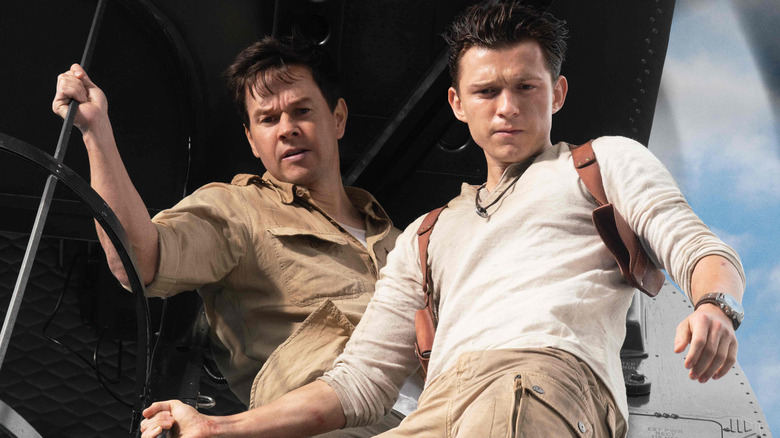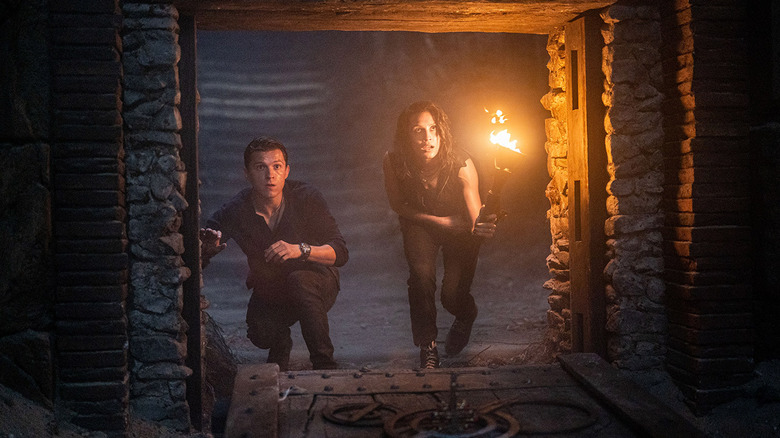
Video games continue to make strides to rival movies themselves in terms of popularity among their fiercest devotees, quickly closing the gap on how "cinematic" they feel and the quality of storytelling on display. But rather than view the medium as the competition, Hollywood has figured out a much better form of coexistence: by greenlighting adaptations of proven video game money-makers. 2021 alone has been somewhat of a mixed bag in that department, with "Mortal Kombat" somehow neglecting to include, you know, the actual Mortal Kombat part, and "Resident Evil: Welcome to Raccoon City" failing to impress. Sony's "Uncharted" will hope for a much better fate when it arrives next year, however, by retelling the beloved video game adventures of Nathan Drake and his mentor Victor "Sully" Sullivan for the big screen.
The stakes are high, not least of all because of the perceived "video game movie curse" that has followed adaptations of these sorts of popular video game narratives in the past. By and large, "Werewolves Within" stands as one of the very few to actually garner generally favorable reviews in recent years, although its inclusion kind of feels like a technicality because of its origins as a party game before being adapted as a 2016 VR game. In any case, the odds appear to be stacked against "Uncharted," but those who are weary of more video game movie disappointment may take heart from the words of the (latest) director of the film adaptation, Ruben Fleischer, who seems well aware of the pitfalls that have sunk many an adaptation in the past. Check out his thoughts on the dreaded "video game movie curse" below.
"I Wanted To Make Sure It Worked As A Film First"

Conventional thought would seem to dictate that the biggest fans of a given property would have the best chance of bringing that material to life for a successful and effective adaptation on the big screen. According to "Uncharted" director Ruben Fleischer, himself a fan of the games, that sort of thinking might very well lead to failure. In the February 2022 edition of Empire magazine, Fleischer is quoted as diagnosing the long-running issue that has plagued many a video game adaptation before. His solution, perhaps somewhat paradoxically to some, is to steer aside from attempting to recapture the singular magic of playing through a great game in the first place:
"Part of the problem is that they're trying to recreate the games. Because players have had such a visceral experience, I don't think you can compete with that. I wanted to make sure ['Uncharted'] worked as a film first."
That's not to say that there shouldn't be any overlap between the two mediums, of course, as Fleischer draws a direct comparison between movies and the "Uncharted" series specifically, as well. "When you're playing the games, it feels like you're inside a movie, so having the opportunity to bring it to life was a real dream come true." He goes on to explain his approach to mixing and matching recognizable imagery from several of the games into this film, balanced against all sorts of new and original ideas that he brought to the table:
"We tried to take inspiration from the games whenever we could, but we also wanted to have original set pieces that aren't a part of the games at all. I've never seen anything like our third act finale before and I think it will blow people away."
If greatness truly does come from small beginnings, to paraphrase Nathan Drake's own personal motto, then perhaps it would be only fitting for the "Uncharted" adaptation to rise above all of its shaky production history to end up as a pleasant surprise in the arena of video game movies. Starring Tom Holland as Drake and Mark Wahlberg as Sully, "Uncharted" comes to theaters on February 18, 2022.
The February 2022 issue of Empire magazine hits shelves on December 23, 2021.
Read this next: The 12 Best Video Game Movies Ranked
The post Uncharted Director Says Most Video Game Movies Go Wrong By 'Trying to Recreate the Games' appeared first on /Film.
from /Film https://ift.tt/3E9XHBr
via IFTTT
Comments
Post a Comment